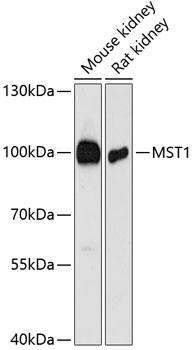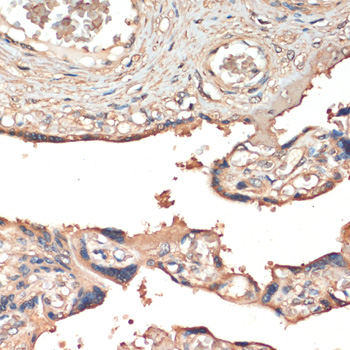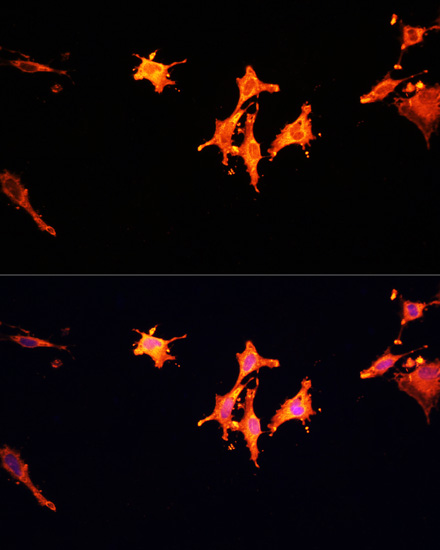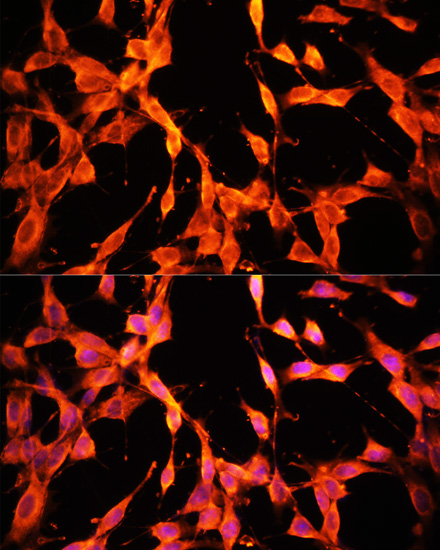Anti-MST1 Antibody (CAB12963)
- SKU:
- CAB12963
- Product type:
- Antibody
- Reactivity:
- Human
- Mouse
- Rat
- Host Species:
- Rabbit
- Isotype:
- IgG
- Antibody Type:
- Polyclonal Antibody
- Research Area:
- Cell Biology
Frequently bought together:
Description
| Antibody Name: | Anti-MST1 Antibody |
| Antibody SKU: | CAB12963 |
| Antibody Size: | 20uL, 50uL, 100uL |
| Application: | WB IHC IF |
| Reactivity: | Human, Mouse, Rat |
| Host Species: | Rabbit |
| Immunogen: | Recombinant fusion protein containing a sequence corresponding to amino acids 200-500 of human MST1 (NP_066278.3). |
| Application: | WB IHC IF |
| Recommended Dilution: | WB 1:500 - 1:2000 IHC 1:50 - 1:200 IF 1:50 - 1:200 |
| Reactivity: | Human, Mouse, Rat |
| Positive Samples: | Mouse kidney, Rat kidney |
| Immunogen: | Recombinant fusion protein containing a sequence corresponding to amino acids 200-500 of human MST1 (NP_066278.3). |
| Purification Method: | Affinity purification |
| Storage Buffer: | Store at -20°C. Avoid freeze / thaw cycles. Buffer: PBS with 0.02% sodium azide, 50% glycerol, pH7.3. |
| Isotype: | IgG |
| Sequence: | CREA ACVW CNGE EYRG AVDR TESG RECQ RWDL QHPH QHPF EPGK FLDQ GLDD NYCR NPDG SERP WCYT TDPQ IERE FCDL PRCG SEAQ PRQE ATTV SCFR GKGE GYRG TANT TTAG VPCQ RWDA QIPH QHRF TPEK YACK DLRE NFCR NPDG SEAP WCFT LRPG MRAA FCYQ IRRC TDDV RPQD CYHG AGEQ YRGT VSKT RKGV QCQR WSAE TPHK PQFT FTSE PHAQ LEEN FCRN PDGD SHGP WCYT MDPR TPFD YCAL RRCA DDQP PSIL DPPD QVQF EKCG KRVD RLDQ RRSK LRVV G |
| Gene ID: | 4485 |
| Uniprot: | P26927 |
| Cellular Location: | Secreted |
| Calculated MW: | 80kDa |
| Observed MW: | 100kDa |
| Synonyms: | MST1, D3F15S2, DNF15S2, HGFL, MSP, NF15S2 |
| Background: | The protein encoded by this gene contains four kringle domains and a serine protease domain, similar to that found in hepatic growth factor. Despite the presence of the serine protease domain, the encoded protein may not have any proteolytic activity. The receptor for this protein is RON tyrosine kinase, which upon activation stimulates ciliary motility of ciliated epithelial lung cells. This protein is secreted and cleaved to form an alpha chain and a beta chain bridged by disulfide bonds. |
| UniProt Protein Function: | MSP: Probably has no proteolytic activity, since crucial characteristic of serine proteases catalytic sites are not conserved. Belongs to the peptidase S1 family. Plasminogen subfamily. |
| UniProt Protein Details: | Protein type:Secreted; Secreted, signal peptide Chromosomal Location of Human Ortholog: 3p21 Molecular Function:serine-type endopeptidase activity Biological Process: sperm motility; spermatogenesis; proteolysis; embryo implantation |
| NCBI Summary: | The protein encoded by this gene contains four kringle domains and a serine protease domain, similar to that found in hepatic growth factor. Despite the presence of the serine protease domain, the encoded protein may not have any proteolytic activity. The receptor for this protein is RON tyrosine kinase, which upon activation stimulates ciliary motility of ciliated epithelial lung cells. This protein is secreted and cleaved to form an alpha chain and a beta chain bridged by disulfide bonds. [provided by RefSeq, Jan 2010] |
| UniProt Code: | P26927 |
| NCBI GenInfo Identifier: | 147744563 |
| NCBI Gene ID: | 4485 |
| NCBI Accession: | P26927.2 |
| UniProt Secondary Accession: | P26927,Q13350, Q14870, Q6GTN4, A6NLA3, A8MSX3, |
| UniProt Related Accession: | P26927 |
| Molecular Weight: | 80,320 Da |
| NCBI Full Name: | Hepatocyte growth factor-like protein |
| NCBI Synonym Full Names: | macrophage stimulating 1 (hepatocyte growth factor-like) |
| NCBI Official Symbol: | MST1 |
| NCBI Official Synonym Symbols: | MSP; HGFL; NF15S2; D3F15S2; DNF15S2 |
| NCBI Protein Information: | hepatocyte growth factor-like protein; macrophage-stimulating protein; hepatocyte growth factor-like protein homolog |
| UniProt Protein Name: | Hepatocyte growth factor-like protein |
| UniProt Synonym Protein Names: | Macrophage stimulatory protein; Macrophage-stimulating protein; MSP |
| Protein Family: | Histone acetyltransferase |
| UniProt Gene Name: | MST1 |
| UniProt Entry Name: | HGFL_HUMAN |








